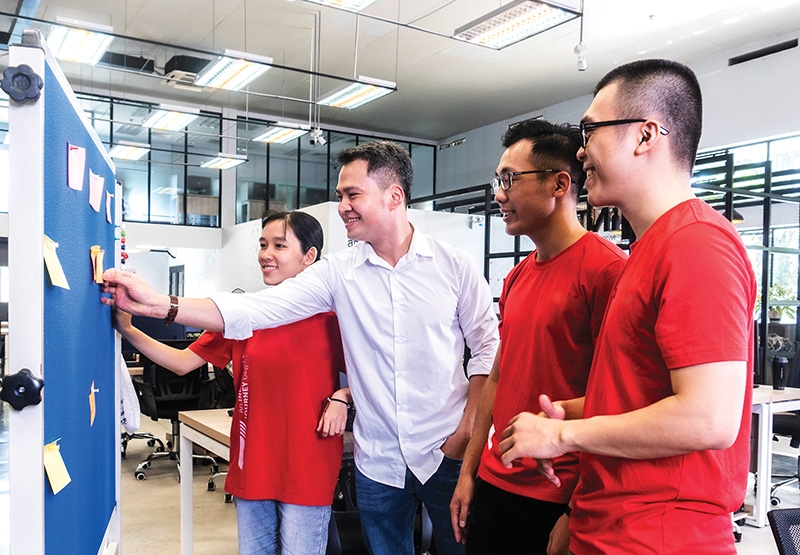Education still on plate for investors
 |
| The number of Vietnamese student overseas doubled within nearly 10 years |
Yola Education JSC from Singapore spent nearly $130,000 establishing a foreign language centre in the southern province of Binh Duong in October after opening another one in the Mekong Delta province of Hau Giang at the same ballpark figure the previous month.
Ngo Thuy Ngoc Tu, co-founder of Yola Education, said that demand for learning English continues to grow, creating a more appetising sector for many investors. “Thus, our expansion in a number of language centres is understandable,” said Tu.
Previously, private investor Kim Ju Hee also established the Saegam South Korean language centre in Thu Duc district of Ho Chi Minh City.
Between January and September, local authorities granted licences for approximately 30 language centres for overseas individuals or companies.
The merger and acquisition (M&A) market in this area is also dynamic, and since August 2018 when Decree No.86/2018/ND-CP on foreign cooperation and investment in education came into effect, overseas investment capital has been maintained in the sector in a stable manner.
According to statistics published by FiinGroup, in the first three quarters of this year, despite being impacted by the COVID-19 pandemic, investment capital in education hit $78.9 million, exceeding the figure of the same period last year of $64.6 million.
Investment via the share contribution and purchase model has increased year-on-year. Notably, FiinGroup says the ratio of investment capital via M&A deals increased from 20.3 per cent in the late five months of 2018 to 46.9 per cent in 2019 and 65 per cent in the first nine months this year.
This growth comes from the increasing demand in the market. The wave of relocating facilities of foreign investors to Vietnam will likely see a steady rise in people attempting to move to the country once borders reopen. A majority of these people will bring their families to the country, thus the demand for education is one of their leading concerns. In addition, the increase in the demand to study a foreign language before going overseas is a factor for the growth of language and education training facilities.
Statistics published by the Ministry of Education and Training showed that the number of Vietnamese student overseas has doubled within nearly 10 years, from 98,000 in the 2010-2011 period to 190,000 as of July this year.
“This contributed a large part to the consecutive increase of English language centres and education facilities because parents expect their children to have a good English base before going overseas,” Le Xuan Dong, head of market research and consulting services at FiinGroup told VIR.
However, along with new investment inflow, the market also sees numerous challenges. In July, Myanmar Strategic Holdings completed the purchase of Wall Street English Vietnam (WSE Vietnam) for $6 million. According to Dong, the founder of WSE Vietnam poured tens of million of dollars into the system and then sold for a low price.
“The founder decided to rush from the market due to the fierce competition in not only the quality of syllabuses but also the tuition and promotion programme,” Dong said.
Egroup, one of Vietnam’s largest companies operating in the education sector, is elsewhere scratching its head over its investment in popular English language centre group Apax English. Egroup continues to oversee a weak performance in Apax Holdings Investment JSC, in which the group holds 71.4 per cent.
According to a VIR source Apax, which runs around 130 Apax English centres across the country, is facing difficulties to maintain existing centre volume, and is even struggling to pay its staff full wages.
Among M&A deals in education, one notable deal in the past decade saw domestic investors buying out international education groups. In 2013, Ismart Education and EQuest Academy took over International American Education (IAE) from Singaporean group Blackhorse Asset Management.
At the time of the deal, IAE managing director Dam Quang Minh said that when foreign investors run into trouble, domestic investors with deep knowledge in the education sector and strong determination should pounce to grab the opportunities.
According to Dong of FiinGroup, M&A will help investors reduce initial costs and the waiting time for licensing procedures, which often take so much time. In addition, they save time in establishing staff members and take over the available facility to expand operations.
“However, unlike other sectors in which the quality is evaluated by tangible products, in the education sector, the quality of facilities is evaluated based on learners’ progress. Thus, investors still can face risky M&A deals if they select partners that do not comply with regulations, or carelessly select teachers and syllabus,” Dong said.
What the stars mean:
★ Poor ★ ★ Promising ★★★ Good ★★★★ Very good ★★★★★ Exceptional
Related Contents
Latest News
More News
- Hermes joins Long Thanh cargo terminal development (February 04, 2026 | 15:59)
- SCG enhances production and distribution in Vietnam (February 04, 2026 | 08:00)
- UNIVACCO strengthens Asia expansion with Vietnam facility (February 03, 2026 | 08:00)
- Cai Mep Ha Port project wins approval with $1.95bn investment (February 02, 2026 | 16:17)
- Repositioning Vietnam in Asia’s manufacturing race (February 02, 2026 | 16:00)
- Manufacturing growth remains solid in early 2026 (February 02, 2026 | 15:28)
- Navigating venture capital trends across the continent (February 02, 2026 | 14:00)
- Motivations to achieve high growth (February 02, 2026 | 11:00)
- Capacity and regulations among British areas of expertise in IFCs (February 02, 2026 | 09:09)
- Transition underway in German investment across Vietnam (February 02, 2026 | 08:00)

 Tag:
Tag:




















 Mobile Version
Mobile Version